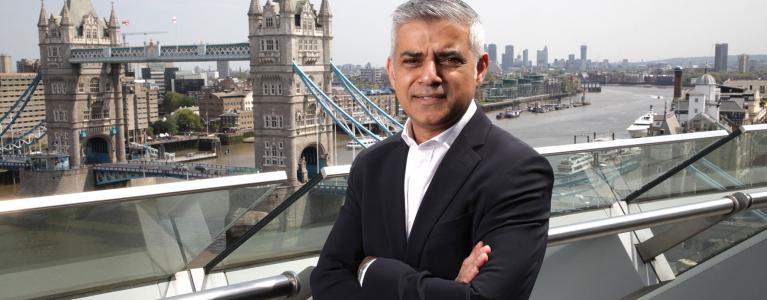
The Mayor of London, Sadiq Khan, has announced today (13 May 2016) that he will launch a formal policy consultation in a matter of weeks on a major package of measures to tackle air pollution in London.
The new Mayor made the announcement during a visit to Sir John Cass's Foundation Primary School, in Aldgate, which has delivered a number of green initiatives including a green roof garden, as the school is close to busy roads and in an area known for high pollution levels.
Announcing the consultation, the Mayor said: "I want to act before an emergency, which is why we need big, bold and sometimes difficult policies if London is to meet the scale of the challenge.”
Almost 10,000 Londoners die every year because of polluted air according to the latest medical research. London does not currently meet the legal requirements for pollutants such as Nitrogen Dioxide (NO2) and new research published by the World Health Organisation just yesterday (12 May 2016) showed that London has breached safe levels of pollutant particles known as PM10.
The proposals in the consultation will include:
•Extending the Ultra-Low Emission Zone (ULEZ) to the North Circular Road and the South Circular Road and the possibility of bringing forward the introduction earlier than 2020. Under current plans the ULEZ will only operate within the Congestion Charging Zone and it is due to come in from 2020.
• Implementing an extra charge on the most polluting vehicles entering central London using the Congestion Charge payment and enforcement system from 2017 (this would not mean an increase in the Congestion Charge but just the method for collecting the extra charge from people driving the most polluting vehicles)
•Introducing ULEZ standards for heavy vehicles London-wide from 2020
•Giving the go-ahead for Transport for London (TfL) to start work on the costs and challenges of implementing a diesel scrappage scheme as part of a wider national scheme delivered by the Government
• Proposals to work with the Government to tackle air pollution on a national and international level.
Proposals for TfL to lead by example:
•Introducing self-imposed ULEZ standards a year earlier for TfL double decker buses
•Implementing clean bus corridors – tackling the worst pollution hotspots by concentrating cleaner buses on the dirtiest routes
•Expanding the ULEZ retrofit programme to 3,000 buses outside the central zone (up from 2,000)
•Purchasing only hybrid or zero-emission double-decker buses from 2018.
The Mayor of London, Sadiq Khan, said:
“I have been elected with a clear mandate to clean up London’s air – our biggest environmental challenge.
“I know from personal experience that the city’s air is damaging people’s health as I only recently started suffering from asthma as an adult. Many pollution hotspots in London are around schools, exposing our children to dangerously polluted air and putting them at greater risk of respiratory conditions like mine.
“The previous Mayor was too slow on this issue and the Government has been hopelessly inactive and it’s Londoners who are suffering as a result. We need to speed up our efforts so I’ll be launching a consultation before the summer to kick-start the process. As well as my proposals, I’ll be seeking views on other ways we can do more to clean up the city’s air.
“In the past, London has only responded after an emergency, like with the Clean Air Act, which followed the Great London Smogs of the 1950s. But I want to act before an emergency, which is why we need big, bold and sometimes difficult policies if London is to match the scale of the challenge.”
Pupils at Sir John Cass's Foundation Primary School are taught about the environment in their lessons and as well as helping plant flowers in the green roof garden, they are encouraged to walk to school and have helped decorate an air pollution monitoring station in their playground.
Notes to editors
•There are two pollutants of particular concern in London: Particulate Matter (PM) and Nitrogen Dioxide (NO2). The UK Government’s action plan includes meeting NO2 legal limits in London by 2025. The Mayor wants to use the package of measures agreed following the consultation to ensure we can achieve this before 2025.
• The World Health Organisation published figures on 12 May 2016 which showed that London has breached safe levels of pollutant particles known as PM10. http://www.who.int/phe/health_topics/outdoorair/databases/cities/en/
•London is currently ranked 15 out of 36 world cities, behind cities like Paris, Berlin and Chicago - AMEC (2014) Comparison of Air Quality in London with a Number of World and European Cities, a report for the GLA
•Almost 10,000 Londoners die prematurely each year, because of polluted air. https://www.scribd.com/doc/271641490/King-s-College-London-report-on-mortality-burden-of-NO2-and-PM2-5-in-London
Measures underway the Mayor is committed to:
•Implement the Ultra-Low Emission Zone (ULEZ) to set minimum emission standards for all vehicles entering central London from September 2020
•Deliver 3,500 hybrid/electric double decker buses and 300 zero emission buses in central London by 2020
•Retrofit 2,000 Euro V buses across London to meet Euro VI standard by 2020 (subject to funding)
•All buses to meet the Euro VI standard (eg retrofit, hybrid, Euro VI) by 2023 (subject to funding)
•Require all newly licensed taxis to be zero emission capable from 2018, with up to £65m in funding to help taxi drivers make this transition
• Facilitate a step change in electric vehicle charging infrastructure, including additional support for residential areas and a rapid charging network with dedicated sites for taxis (£23m in funding received from Government)
•Robustly enforcing the Non Road Mobile Machinery Low Emission Zone to reduce emissions from construction equipment (subject to extra powers from Government)
•Continuing the Mayor’s Air Quality Fund to help boroughs address local air quality hotspots.
•Continue the LoCity programme working with manufacturers, operators and businesses to reduce emissions from HGVs and vans (first annual conference 25 May 2016).